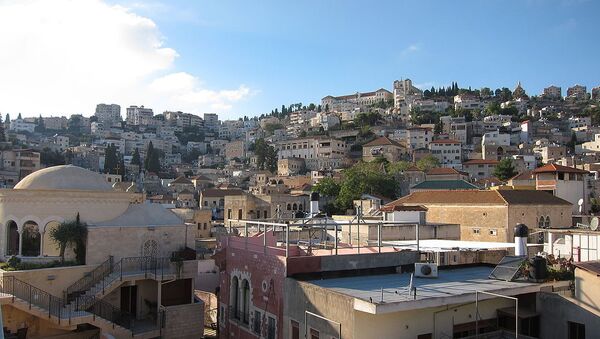Nazareth, located in Israel's north, has always been known for its rich biblical history and connection to Christianity.
Now, however, this city will also be associated with something else - high rates of coronavirus patients and the looming threat of a total lockdown.
Recently, Israel's coronavirus chief, Prof. Ronni Gamzu, appointed to tackle the health crisis, set up the so-called "traffic light plan" that stipulated a division of the country into red, orange, yellow, and green zones.
An area that received more than 7.5 percent on the scale of ten was considered red, and Nazareth was given 7.8, meaning it would also face a number of restrictive measures.
These include the shutting down of schools, public institutions, and private businesses, except those considered essential.
Restrictions on movement will be imposed too, and residents will be advised to stay at home and be limited to a radius of up to 500 metres from their residences, while the police will limit access to the city as well as control entries and departures.
Nazareth Turns Red
The measures also presuppose that public gatherings will continue to be limited, including weddings and other celebrations, and Samer Anzawi, a local resident says it will be highly beneficial for his city.
"Weddings were the main cause to the spread of the pandemic", said Anzawi, who claims he shuns such gatherings, primarily because he fears for the health of his elderly mother. "Although there are restrictions on the amount of people who can attend such ceremonies, people here don't adhere to the rules and very often you can see hundreds at one wedding. Nobody cares to wear facemasks, or, God forbid, to keep two metres' distance".
Nazareth is not the only city with a predominantly Arab population that has been defying the regulations set by the coronavirus cabinet, which was established with the aim to contain the spread of the deadly virus.
Over the past several months, Israeli media has registered a number of instances where weddings have been held despite a ban imposed on them.
The situation has now become so acute that out of 33 cities currently considered red, 22 are towns with a predominantly Arab population, with Gamzu warning that if the situation continues to deteriorate, the Arab sector will see hundreds of deaths in the upcoming months.
Can Lockdown Help?
Even now, when the threat of a full lockdown is hovering in the air, Anzawi says he still sees people who don't abide by the regulations.
"Of course there are those, who wash their hands multiple times a day, who put on their face masks and who maintain social distancing, but there are also those who couldn't care less about these restrictions and often times people say they trust God and count on him to keep the disease at bay".
In a crowded city like Nazareth with nearly 80,000 residents, endless traffic jams, and queues, such carelessness is a recipe for disaster, and although Anzawi believes the police should fine wedding halls that defy the restrictions, he has mixed feelings about the decision to shut down the city completely.
"In the past, a lockdown of the entire country proved itself", said Anzawi, referring to Prime Minister Benjamin Netanyahu's decision to shut down Israel for nearly two months during the first wave of the pandemic that broke out in late February.
At the time, the rate of infection dropped significantly and Israel was about to declare that it had managed to put an end to the spread of the pandemic.
But the lockdown also took a toll. More than a million out of the country's nine million people have lost their jobs, something that has led to mass demonstrations against the government and the financial policies it represented.
Anzawi says another lockdown might only accelerate that process, the general feeling of distrust in the government, and the mood of disobedience.
"Many people have nothing to eat. Even if a lockdown is not imposed and the government only decides to implement strict measures such as the shutting down of businesses, many will still prefer to open them and get a fine, rather that die of starvation".
That's why, Anzawi says, the government should introduce a clear financial policy before it toys with the idea of imposing a lockdown on towns and cities.
Previously, in a bid to keep people afloat, Israel distributed grants to individuals and families, with the minimal sum standing at slightly more than $200 for each person.
However, many complained that the money was too little, came too late, and was unable to keep the head of those who were drowning under the heavy financial load above water.


